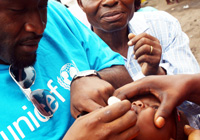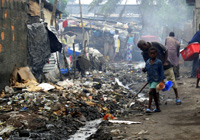Congo, Democratic Republic of the
In DR Congo, soccer star and UNICEF National Ambassador Tresor Lualua promotes polio vaccination
 |
| © UNICEF 2012/DRC |
| UNICEF National Ambassador and Congolese soccer star Tresor Lualua administers two drops of the protective polio vaccine to a girl in Kinshasa, DR Congo. |
By Cornelia Walther
KINSHASA, Democratic Republic of the Congo, 15 June 2012 – Congolese soccer star and UNICEF National Ambassador Tresor Lualua recently accompanied a mobile team of polio vaccinators in Kinshasa during the second round of the 2012 National Immunization Days.
He spent time with children and parents in Kingabwa, one of the city’s most marginalized areas, and also participated in vaccinating children.
“I don’t think that vaccination against polio is important – I know it is,” Mr. Lualua said. He applauded the joint efforts of the Government, UNICEF, the World Health Organization (WHO), and partners such as Rotary International and the Bill and Melinda Gates Foundation for their efforts to create a polio-free Congo.
After having reported no new cases between 2000 and 2005, the Democratic Republic of the Congo (DRC) registered 13 new cases in 2006, 41 in 2007, five in 2008 and three in 2009. After a peak of 100 cases in 2010, the number dwindled to 93 cases in 2011 thanks to massive vaccination efforts of the Government, with support from its partners. From January to mid-June 2012, no new cases of the wild polio virus were recorded in the country. But the threat is not over.
 |
| © UNICEF 2012/DRC |
| A road in Kingabwa, a marginalized part of Kinshasa, DR Congo, where cholera is a known threat. |
Need for routine immunization
Immunization gaps are the central cause of the re-emergence and subsequent transmission of polio in DRC. Insufficient routine immunization coverage is the root cause, which can be overcome only by investment in strong health services at the central and local level.
Factors having a negative impact on children’s immunization status include living in difficult-to-reach areas, such as areas with insecurity or poor road infrastructure; population movements between neighboring countries; a weak epidemiological surveillance system with insufficient data; deficient cold chains; and an overall frail health system. Distrust by families and parental refusal to vaccinate children based on religious beliefs further complicate the situation.
Although it increased from 46 per cent in 2007 to an estimated 66 per cent in 2011, today’s routine immunization coverage remains insufficient to eradicate the wild polio virus from DRC. Even though four out of five children from the richest families are completely vaccinated, only about one in three children are vaccinated in disadvantaged households. Children living in remote, rural areas are at particular risk.
 |
| © UNICEF 2012/DRC |
| UNICEF National Ambassador Tresor Lualua greets a child in Kinshasa, DR Congo. |
Need for improved water and sanitation
Polio is transmitted primarily through the fecal-oral route, meaning the disease occurs when food, water or hands are contaminated by human waste. This can happen as a result of poor hygiene habits and lack of proper water and sanitation infrastructure. Coupled with poor immunization, these factors create the perfect environment for diseases to spread.
Today, only one in two Congolese people has access to safe water and only 14 per cent live with improved sanitary conditions.
"In an area as bad as this one, with no hygiene, it is not just about polio. It is also about cholera. If we want children to survive under these conditions, we must ensure that they get the vaccination. But they also need access to safe water, health care and education," said Mr. Lualua during his tour with the vaccination team. "We need people to pay attention and get involved, now!”

